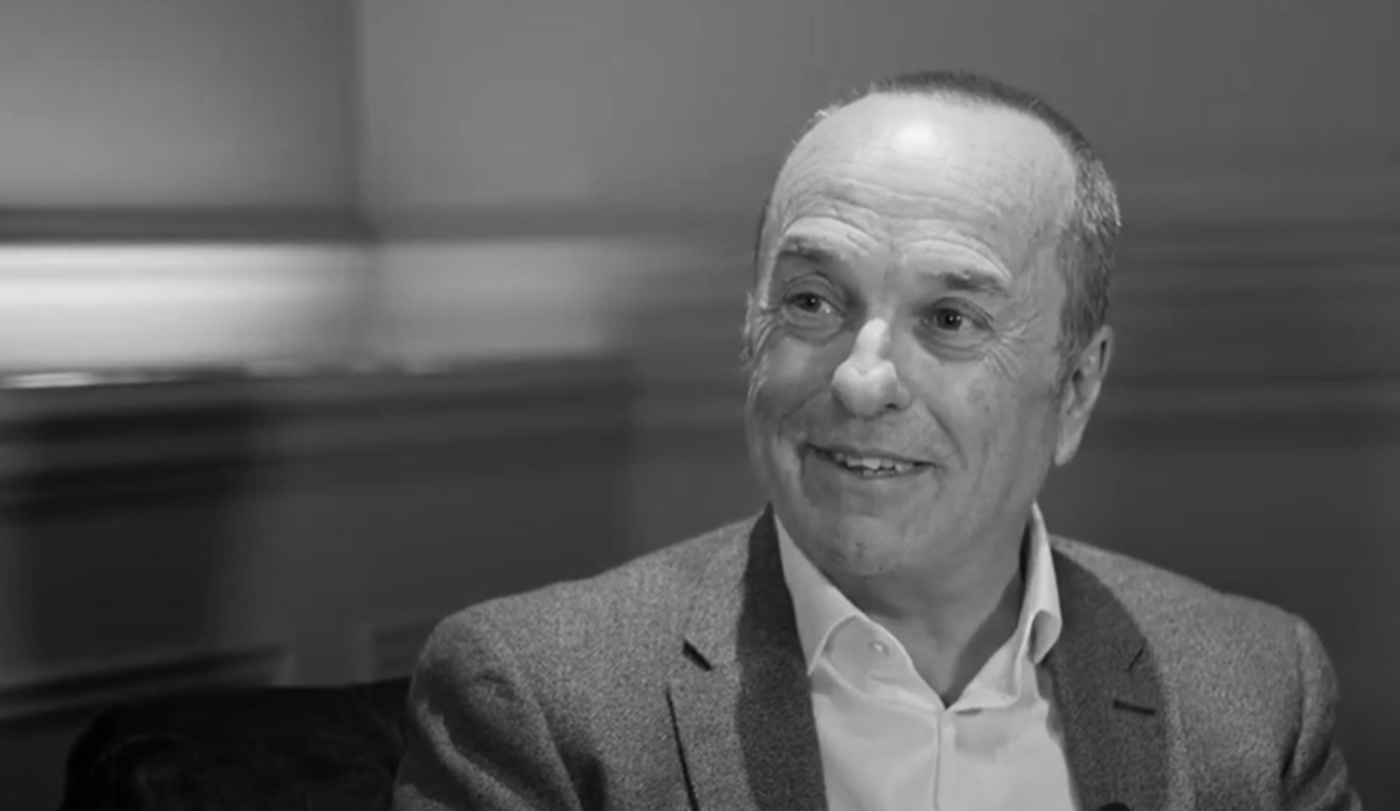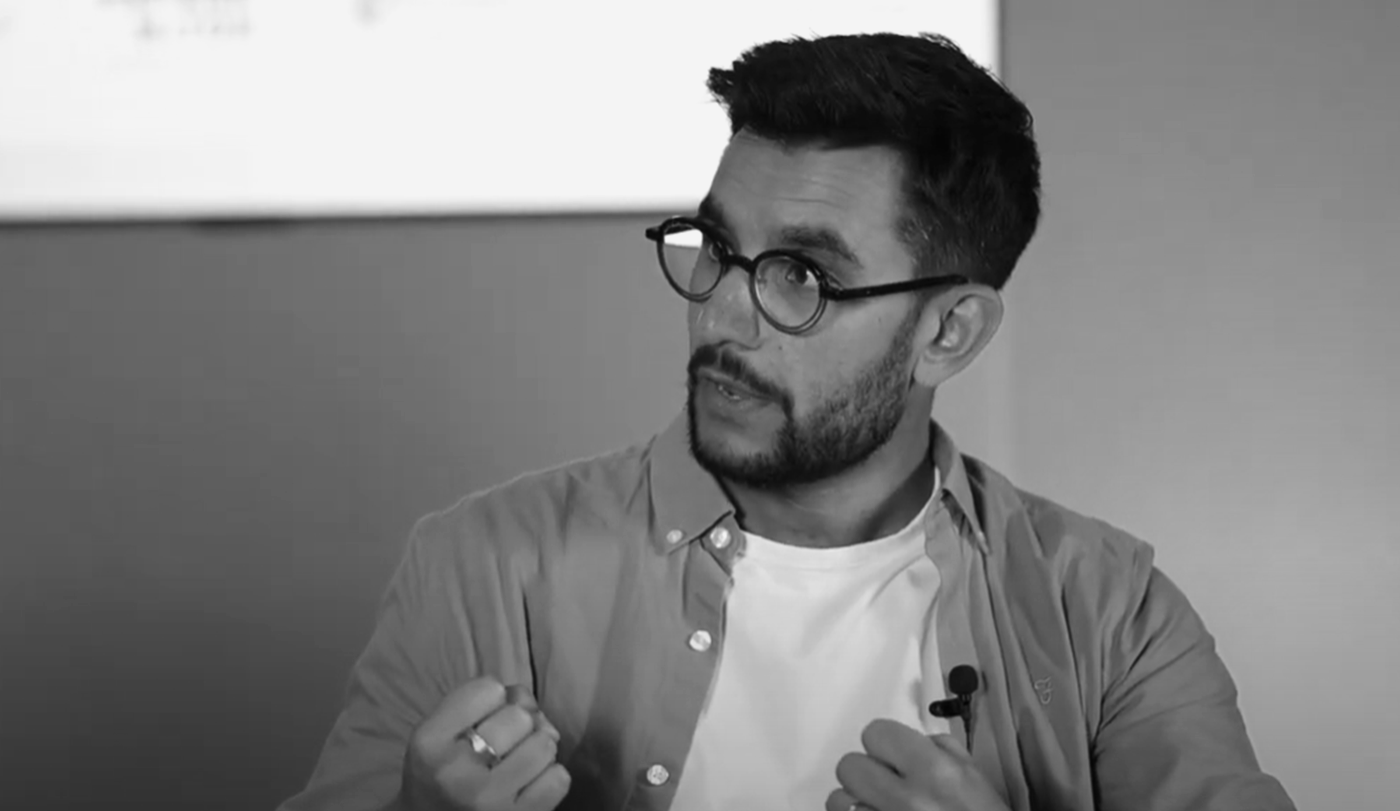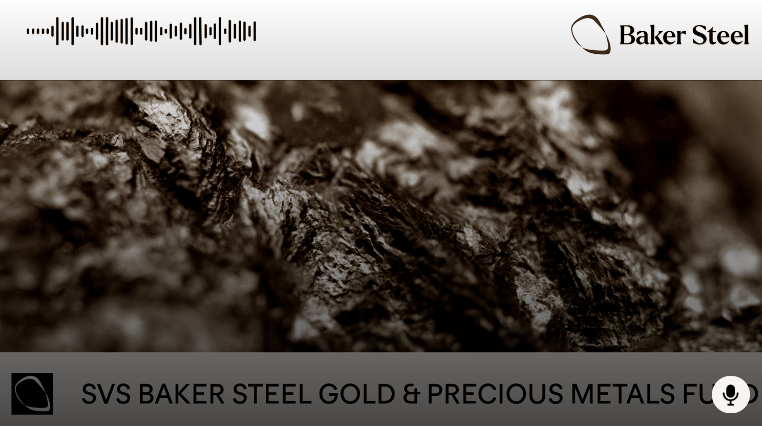On compounding returns, valuation discipline and wealth managers’ duty of care to clients
In our regular video series, we interview the wealth sector’s key decision-makers to discover how they think about life, both within the world of investment and beyond it; what brought them into the business and what keeps them here; and what makes them and their companies tick
‘Compounding returns’ may not be the most exciting answer to a question on the most exciting thing about current markets, acknowledges Ian Wood, CIO at Titan Investment Solutions – but, then again, he is not convinced excitement in the context of investment is all it is cracked up to be.
“Compounding returns is absolutely crucial for clients in delivering their long-term outcomes,” he tells Wealthwise editorial director Julian Marr in this latest Choice Words episode. “So, when we think about investments, we think about those businesses and those funds that can invest in assets that can generate and then compound free cashflow over a long period of time – because that still matters in the marketplace.
“If we can find businesses that can generate 30% or 40% return on capital off free cashflow and reinvest that free cashflow at a high return, that drives compounding of free cashflow – and price as well. And the market will eventually cotton onto that – and share prices do follow free cashflow over the long term.”
The important caveat, adds Wood, is not overpaying for that free cashflow upfront. “That valuation discipline is really important to us,” he continues. “I am a Yorkshireman – I don’t want to overpay for anything! So we think about valuation slightly differently – and the valuation element is where most of our work goes.
“Equities are very long or infinite-duration assets but the market finds it easy to think about things on next year’s earnings multiple. I do not think that is a sensible way to think about valuation and so, while it may be a bit more difficult, I prefer modelling free cashflow over time and reverse-engineering a DCF to get an implied growth rate.”
The fund manager’s job, then, is to go out, be unemotional about things and pick up those quality assets at the right price – and that should drive returns for clients in the future.”
At heart, Wood wants to understand what a business’s share price is suggesting about its future growth prospects. “If we can find a business that has historically grown at maybe 10% or 15%, is now expected to grow at maybe 5% to 10% and the implied growth rate is maybe 2% or 3%, then we have a margin of safety where we could be really wrong on our investment thesis, and we can generate alpha by buying those businesses,” he says.
“Quality businesses do go on sale from time to time – usually because of something nasty like Covid or war or whatever it may be – but the fund manager’s job, then, is to go out there, be unemotional about it and pick up those quality assets at the right price. And that should drive returns for clients in the future.”
Long-term game
Later in the conversation, when asked what advice he would have given himself on his first day in the business, Wood replies: “‘Be more patient – this is a long-term game’. When you first come into the industry, you can think fund management is an exciting place to be but, at the heart of it, I think it should be quite dull and boring if we are going to give people good outcomes.
“My view is, if you can compound clients’ assets at 8% or 9% or 10% a year – which is what equities broadly give you – then that is a really attractive outcome. And I have a strong view that some sort of basic financial maths should be taught in schools – because I am pretty sure, if you give a bunch of kids a number and say, Compound that at 8%, 9%, 10% for 40 years, you will definitely get their interest.
“And I don’t think I understood that when I first came into investing. I didn’t think it was all about ‘getting rich quick’ as such but more, you know, buying the ‘go-go’ stocks. And actually, in reality, you generate more wealth for clients by buying good-quality businesses. It is definitely the most sustainable and consistent investment methodology – and so that is why we do what we do.”
A full transcript of this episode can be found after this box while you can view the whole video by clicking on the picture above. To jump to a specific question, just click on the relevant timecode:
00.00: What excites you about the current investment outlook? What worries you?
02.50: What do you most look for in an individual investment? What constitute red flags?
04.45: To what degree should professional investors be thinking beyond so-called traditional investments? Towards what?
05.55: What is your approach to client communications?
07.04: What was your path into investment – and, if you had not taken it, what do you think you would be doing now?
07.55: How would you explain risk to somebody who does not work in investment?
08.53: Do you see the rise of AI as an opportunity or a threat to professional investors – or both?
09.53: What is the biggest investment mistake you are prepared to admit to – and what did you learn from it?
11.38: What advice would you have given your younger self on your first day in this business?
12.56: Two Choice Words recommendations, please – one a book; one a free choice?
Transcript of Choice Words Episode 19:
Ian Wood, with Julian Marr
JM: Well, hello and welcome to another in our series of ‘Choice Words’ videos, where we get to meet the great and the good from the worlds of UK fund selection and fund research. I am Julian Marr, editorial director of Wealthwise, and today I am delighted to be talking to Ian Wood, who is CIO at Titan Investment Solutions. Hello, Ian.
IW: Hello. Thanks for having me.
JM: It is a pleasure. Jumping straight into our first question, what most excites you about the current investment outlook? And what gives you pause for thought?
IW: I mean, it’s a pretty boring answer to start with …
JM: Well, we always can build up from here!
IW: Compounding returns is absolutely crucial for clients in delivering their long-term outcomes. So, when we think about investments, we think about those businesses and those funds that can invest in assets that can generate and then compound free cashflow over a long period of time – because that still matters in the marketplace.
If we can find businesses that can generate 30% or 40% return on capital off free cashflow and reinvest that free cashflow at a high return, that drives compounding of free cashflow – and price as well. And the market will eventually cotton onto that – and share prices do follow free cashflow over the long term. The important caveat to that is you do not overpay for that free cashflow upfront. That valuation discipline is really important to us.
Lots of concerns around at the moment. Obviously, we have geopolitical risk. We have Donald Trump in the White House making lots of different statements and changing his mind quite regularly. We try not to get involved with the noise too much – we try to think about things in the long term.
There are some very smart people out there who can make investment decisions based on short-term macro and geopolitical themes – that’s not our game. We are always talking about trying to deliver long-term outcomes for clients – and that comes from a selection of equities and bonds and then other non-traditional assets within the portfolio.
JM: Sorry to go off-piste immediately but, just behaviourally, do you have any processes for tuning out the noise? It is a great skill.
IW: Yes, absolutely. The macro is very important but, from my view, as a fund manager, my job is to pick the best stocks within the portfolio and try and ignore the short-term noise – and we do that through behavioural processes within the portfolio that make us ask questions of ourselves and make us concentrate on the long term.
If you can concentrate on the long term, the short-term noise becomes less important. It is always there, it is always at the back of your mind and sometimes it is difficult to ignore it – but I think the best investors find a way to ignore the short-term noise and really concentrate on long-term outcomes for clients.
Competitive advantage
JM: Great start. Moving from the macro to what draws you to individual stocks, you have already touched on compounding as a key attraction but is there anything else beyond that? And then, on the flipside, what do you see as ‘red flags’?
IW: Yes, that is important. We want to buy high-quality companies – and everybody knows what they are. You know, we are not reinventing the wheel here – everybody knows what the best businesses are in the world. They are those businesses that have some sort of competitive advantage – some sort of ‘economic moat’, as Buffett would say – whether that comes from pricing power, which may come from brand, say, or a technological advantage or maybe a scale advantage.
Those businesses that can reinvest at a high return just generate more cash – and share prices will follow that. The really important thing is this is not buying quality at any price. I am a Yorkshireman – I don’t want to overpay for anything! So we think about valuation slightly differently – and the valuation element is where most of our work goes. Equities are very long or infinite-duration assets but the market finds it easy to think about things on next year’s earnings multiple. I do not think that is a sensible way to think about valuation.
It is a little bit more difficult – but I prefer modelling free cashflow over time and reverse-engineering a DCF to get an implied growth rate. So what is the share price suggesting about the future growth of that business? And if we can find a business that has historically grown at maybe 10% or 15%, is now expected to grow at maybe 5% to 10% and the implied growth rate is maybe 2% or 3%, then we have a margin of safety where we could be really wrong on our investment thesis, and we can generate alpha by buying those businesses.
Quality businesses do go on sale from time to time – usually because of something nasty like Covid or war or whatever it may be – but the fund manager’s job, then, is to go out there, be unemotional about it and pick up those quality assets at the right price. And that should drive returns for clients in the future.
Valuation framework
JM: Very good. To what degree do you think professional investors need to look beyond more traditional assets – let’s call that cash, equities and bonds – and into more ‘alternative’ parts of the market?
IW: We do invest in alternatives at Titan. I think equities, cash and bonds will always be a core part of portfolios – we have a long-term history of how these things behave and the returns they generate. The important thing about alternative or non-traditional assets is we have to understand them properly – you know, crypto assets would be a prime example of that.
And I can’t value cryptocurrency. I can’t value gold either but I have 100 years’ worth of data on gold, which tells me how it behaves. I don’t have that luxury in the non-traditional crypto assets – so we need to build a valuation framework so we can understand what we are buying.
At the end of the day, we are fundamental investors and we want to be able to buy things at a discount to fair value – that is how we can add value over time. So they definitely have a part to play and infrastructure assets or, you know, some private assets are really important parts of the portfolio. We do invest in those at Titan – but we have got to have a really good understanding before we have the confidence to expose our clients to them.
Comfortable clients
JM: Thank you for that. Moving on to client comms, what is your approach – or the Titan approach – to client communications? Specifically, the piece that really interests me is looking to educate your clients to try and ensure they stay along for the full journey and so enjoy the full benefit of investing with you.
IW: I think you just have to be completely open and honest – so, for example, a macro piece goes out on a monthly basis. My background is private client portfolios up in Harrogate, which is a business that Titan acquired about three years ago, so we constantly write to clients – and that has been taken on by the wider group now. So communications have become a lot better in the last sort of 18 months.
We want clients to be comfortable. There is volatility in the market but we want people to understand that volatility is not a pure measure of risk – and I think it is important we hold people’s hands through the journey because investing can be quite an emotional thing for clients. If you have worked your entire life, saved a nest egg and give it to an asset manager to look after, they then have a duty of care to make sure you are invested in the right assets, and also to make sure you feel comfortable along the way.
Building work
JM: Very good. A more personal question now – what was your path into investment and, in an alternative universe, what would you be doing if you had not taken that path?
IW: I did Physics at university so I am very ‘mathsy’ and quantitative. I probably couldn’t see myself doing anything else other than that. I have to have a process and a locked-down approach doing everything I do. I like to build things – so I build lots of financial models. I’m not building brick walls but, at the end of the day, I like to say, This is what I have done – this is going to help me be a better fund manager in the future.
I wanted to be professional sportsman – cricket was my game – but I realised quite early on that I was pretty rubbish and so I gave up on that quite quickly! So I think, if I had not gone into this, it would have been something analytical, something quantitative – probably an engineering sort of background, I would imagine – after school.
Beyond volatility
JM: May I quickly pick up on something you mentioned on the comms side – just on risk? I know risk can mean different things to different people but how would you explain it to somebody who does not work in investment?
IW: Definitely not in terms of volatility – I think volatility is a very, very blunt tool. For me, risk is permanent loss of capital and not meeting clients’ outcomes – you know, clients give you their money because they have an end-goal in sight and it is our job to make sure we meet those expectations.
I think the market has anchored on volatility because it is easy to calculate – the industry is inherently quite lazy, so we tend to use measures like PE ratios and volatility because they are simple things to calculate. But I do believe that, in the long run, meeting client outcomes and making sure we generate the returns that are offered in the marketplace is absolutely the risk you take when you put your money with an asset manager.
Human oversight
JM: Thank you. And just taking advantage of your science background, do you see the rise of AI as an opportunity or a threat – or both?
IW: Absolutely both. We use it – it is great for doing analytical ‘deep dives’, say, and looking at large amounts of data but the prompts are really important. I mean, a number of times over the last year or so, as this sort of thing has come to the fore, we have had some pretty dodgy output from the AI models. And the AI models are great – it’s usually the prompt that is incorrect. You have to double-check everything that comes out of it.
And I just worry that we do become over-reliant on AI and it stops you thinking for yourself. At the end of the day, AI is great for doing that data work but it has not got the ability to understand business nuance or whatever it may be – that still requires a human being to have oversight. So really, really powerful and really, really exciting – but then slightly terrifying at the same time.
Judgement call
JM: Very good. Moving from computer mistakes to personal ones, what is the biggest investment mistake you are prepared to admit to and what did you learn from it?
IW: I don’t think anybody should be scared of admitting to mistakes – it’s dangerous if you can’t admit to mistakes. I mean, fund managers make mistakes from time to time. Its part of the job – you have to get used to it. I think if you are the sort of person who can’t admit you make mistakes, then you are probably in the wrong game.
So there was a business – a semiconductor business – five or six years ago and, on our spreadsheets and all our models, it looked absolutely fantastic. You know, it was great value optically, it was growing very, very quickly, it was a high-quality business – but I made the mistake of looking too short-term. I was looking at near-year earnings multiples and I failed to understand how cyclical that semiconductor cycle can be.
It was a really poor investment for us as a result – and the lesson we learned from that was, Stop looking at near-year earnings multiples. Model the cashflows and understand what future growth is required to justify the current share price – and then we can make a judgement call because we have framed the valuation argument.
You need to do that. There is no formula out there that tells you what EV/EBITDA multiple a stock should trade on for a given level of growth or a given level of quality – it is all too subjective. So I try my best to quantify everything – and a reverse DCF is the way we do it. And we sort of generated that process five or six years ago as a result of mistakes we made by investing in optically-cheap earnings-multiple stocks.
More patience
JM: Thank you. Home straight now – just a couple more questions. First, what advice would you have given yourself on your first day in the business?
IW: Probably, Be more patient – this is a long-term game. When you first come into the industry, you can think fund management is an exciting place to be but, at the heart of it, I think it should be quite dull and boring if we are going to give people good outcomes. My view is, if you can compound clients’ assets at 8% or 9% or 10% a year – which is what equities broadly give you – then that is a really attractive outcome.
I have a strong view that some sort of basic financial maths should be taught in schools – because I am pretty sure, if you give a bunch of kids a number and say, Compound that at 8%, 9%, 10% for 40 years, you will definitely get their interest.
And I don’t think I understood that when I first came into investing. I thought it was all about – not ‘getting rich quick’ as such but, you know, buying the ‘go-go’ stocks. And actually, in reality, you generate more wealth for clients by buying good-quality businesses. It is definitely the most sustainable and consistent investment methodology – and so that is why we do what we do.
Un-sight screens
JM: Last question, then. We call this ‘Choice Words’ because of the professional choices you make but now we are after a couple of personal recommendations from you. One would be for a book – it can be on investment but it does not have to be – and the other one is actually a ‘free hit’.
IW: I don’t do an awful lot of reading so this is a very short book – it’s Joel Greenblatt’s The Little Book that Beats the Market. It may be short but it is incredibly powerful – a great way of thinking about return on invested capital.
You know – it’s probably a sign of my level of intelligence! – but he wrote that book to teach his kids and tell his kids what he did for a living. That really resonated with me – and buying those high-return-on-capital businesses is what has proven to be very successful for me in my career, in terms of investing in high-quality companies.
JM: Great stuff. In terms of your ‘free hit’, we have had golf courses, restaurants, podcasts, sitting in St Paul’s Cathedral as a great life experience – what would you recommend?
IW: So my kids play cricket. I have two boys and a girl, they all play cricket and so my entire weekend, every weekend, is sitting down for seven hours and watching them play cricket – wherever they are playing on that particular day. I love cricket – I appreciate it can be a little bit boring from time to time. And I think you have got to get away from the screens – and cricket is a perfect opportunity for me to do so.
I probably do my best thinking sat in my deckchair watching the kids play cricket. The prices on the screen can be your worst enemy – it can make you behaviourally react to situations in a bad way. So we try our best, myself and my wife, to have as much downtime away from this – because it can be all-consuming. So just time away from the screens – and it is cricket for me.
JM: Nicely done. Great life philosophy, great choices and great interview. Thank you so much for your time, Ian.
IW: Thank you.
JM: And thank you very much for watching. Please do look out for further Choice Words videos as they are published.









